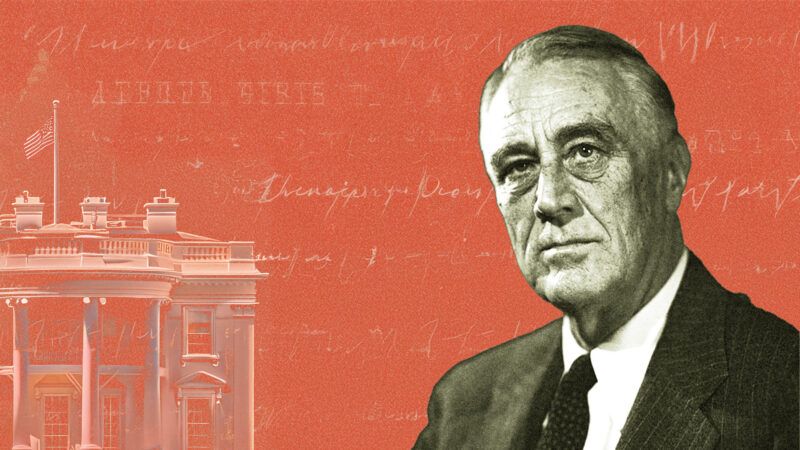What the Japanese Internment Case Teaches About Judicial Deference to Presidential Power
Long-ago debates about executive authority are not as distant as they might initially seem.

The basic facts of the U.S. Supreme Court's 1944 decision in Korematsu v. United States, which upheld President Franklin Roosevelt's wartime internment of Japanese-Americans, are well-known but still worth a sketch. That is because the case serves as an all-too-timely warning about how judicial deference to executive power has warped American law.
You’re reading Injustice System from Damon Root and Reason. Get more of Damon’s commentary on constitutional law and American history.
On February 12, 1942, Roosevelt issued Executive Order 9066, which authorized the forced removal of Japanese-Americans from their homes and communities on the West Coast "by virtue of the authority vested in me as President of the United States, and Commander in Chief of the Army and Navy." Fred Korematsu, a U.S. citizen of Japanese descent, argued that Roosevelt's actions violated his constitutional rights. But the Supreme Court took a different view, ruling 6–3 that the forced removal and internment of Japanese-Americans was a perfectly lawful exercise of the president's powers.
The Korematsu opinion was written by Justice Hugo Black, a Roosevelt appointee and ardent New Dealer. Black is sometimes remembered today as a civil libertarian, a reputation he earned by sometimes writing forcefully in support of the First Amendment and other provisions of the Bill of Rights. "Courts must never allow this protection to be diluted or weakened in any way," Black wrote about freedom of speech in his book A Constitutional Faith. The First Amendment must be protected by the courts "without any deviation, without exception, without any ifs, buts, or whereases."
Yet this supposed civil libertarian also wrote the majority opinion upholding concentration camps for innocent American citizens. And Black did not even express any public regret over his Korematsu ruling in the decades to come. "It is noteworthy," the legal scholar Stanley Kutner once observed, "that in an interview shortly before his death, Justice Black maintained that both the President and the Court had been right in their wartime actions."
According to Black, the outcome in Korematsu was dictated by the existence of emergency conditions and the resulting judicial deference owed to the executive branch. "The military authorities considered the need for action was great, and time was short," Black declared. "We cannot—by availing ourselves of the calm perspective of hindsight—now say that at that time these actions were unjustified."
Writing in dissent, Justice Frank Murphy, another Roosevelt appointee and ardent New Dealer, argued that the president's actions were, in fact, clearly unjustified at the time he took them. "It is essential that there be definite limits to military discretion, especially where martial law has not been declared," Murphy wrote. "Individuals must not be left impoverished of their constitutional rights on a plea of military necessity that has neither substance nor support."
These dueling opinions capture the judicial debate over executive power in a nutshell. For Black, the judicial scales had to be tipped entirely in Roosevelt's favor because "the military authorities considered the need for action was great." For Murphy, by contrast, judicial vigilance must be maintained in the face of the executive's claims of "military necessity" precisely because such claims might have "neither substance nor support."
In other words, the overriding questions are these: Should the courts defer to the president whenever military necessity or emergency conditions have been invoked? Or should the courts scrutinize the president's actions even when—or especially when—pleas of military necessity or emergency have been made?
This clash over executive authority and its limits is still raging today, of course, as evidenced by the current legal battles over the supposed power of the president to unilaterally send military forces into U.S. cities against the objections of city and state officials; over the supposed authority of the president to summarily deport alleged criminal aliens as an exercise of his war powers; over the president's supposed emergency power to unilaterally launch a trade war; and over the president's supposed authority to launch military strikes against suspected drug smugglers without an accompanying declaration of war or any other form of congressional approval.
Korematsu's long-ago debate about the judiciary's proper role as a check on the executive is not so distant as it might initially seem.


Show Comments (71)